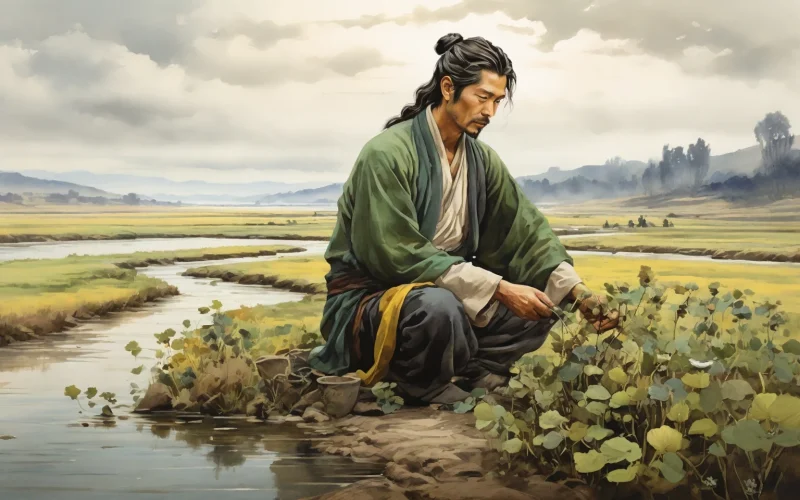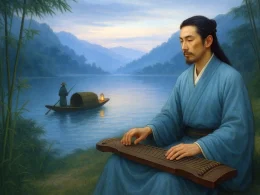A man is rootless in his day,
Floating like dust along the way.
Blown east and west, no longer am I
Still the same as in days gone by.
When born, I may be called your brother,
why then should we not love each other?
Let us enjoy when days are fine,
Call neighbors out to drink our wine!
The prime of our life won’t come twice;
Each day can’t have two mornings nice.
I urge you to rise with the sun,
For time and tide will wait for none.
Original Poem
「杂诗 · 其一」
陶渊明
人生无根蒂,飘如陌上尘。
分散逐风转,此已非常身。
落地为兄弟,何必骨肉亲!
得欢当作乐,斗酒聚比邻。
盛年不重来,一日难再晨。
及时当勉励,岁月不待人。
Interpretation
Composed in 414 CE when Tao Yuanming was fifty years old and had lived eight years in rural seclusion, this poem reflects the poet's philosophical maturity forged through national upheavals and career disappointments. Blending Confucian activism with Daoist naturalism, Tao developed a unique worldview that embraced both soaring ambition ("aspirations reaching beyond the four seas") and recluse's devotion ("my nature loves hills and mountains"). The poem confronts life's impermanence with enlightened equanimity, demonstrating the poet's clear-eyed awareness of mortality while advocating the carpe diem philosophy - urging readers to cherish fleeting time through mindful enjoyment.
First Couplet: "人生无根蒂,飘如陌上尘。"
Rénshēng wú gēndì, piāo rú mò shàng chén.
Rootless, life drifts without trace,
Like roadside dust in empty space.
The foundational metaphor establishes existence's transient nature through the "rootless" (无根蒂) human condition and "dust" (尘) imagery, invoking Buddhist concepts of impermanence (无常).
Second Couplet: "分散逐风转,此已非常身。"
Fēnsàn zhú fēng zhuǎn, cǐ yǐ fēicháng shēn.
Scattered by winds that twist and turn,
This fleeting form's not ours to own.
Develops the metaphor through kinetic verbs ("scattered" 分散, "twist" 转), reinforcing Daoist notions of the provisional self (非常身). The wind represents cosmic forces beyond human control.
Third Couplet: "落地为兄弟,何必骨肉亲!"
Luòdì wéi xiōngdì, hébì gǔròu qīn!
All who breathe share brother's grace,
Why prize mere bloodline's narrow space?
Radically redefines kinship through the verb "become" (为), challenging Confucian familial hierarchy with a universalist ethic reminiscent of Mohist "impartial care" (兼爱).
Fourth Couplet: "得欢当作乐,斗酒聚比邻。"
Dé huān dāng zuòlè, dǒu jiǔ jù bǐlín.
When joy appears, let joy be found,
With wine-jars calling neighbors round.
The imperative "应当" (must) transforms philosophy into practice. The "dou measure" (斗) of wine symbolizes communal egalitarianism - all share equally regardless of status.
Fifth Couplet: "盛年不重来,一日难再晨。"
Shèngnián bù chónglái, yīrì nán zài chén.
Prime years won't come again,
No dawn rewrites its end.
The temporal paradox - "prime years" (盛年) versus "single day" (一日) - collapses long and short durations into shared ephemerality. The "dawn" (晨) motif echoes earlier "dust" imagery as cyclical yet irreversible.
Sixth Couplet: "及时当勉励,岁月不待人。"
Jíshí dāng miǎnlì, suìyuè bù dàirén.
Now rouse yourself, now rise,
Time waits not for the wise.
The doubled imperative "及时当" (must now) creates urgent rhythm. "Time" (岁月) personified as an indifferent force completes the poem's movement from observation to exhortation.
Holistic Appreciation
"Miscellaneous Poems I" articulates Tao Yuanming's profound insight into life's brevity and impermanent nature through deceptively simple language, while simultaneously advocating carpe diem with magnanimous spirit. The poet contemplates life's illusory quality without succumbing to pessimism, instead expressing his cherishment of human warmth through convivial wine-sharing with neighbors. The poem's emotional cadence flows effortlessly from philosophical reflection to enlightened optimism, culminating in rational self-exhortation—a testament to Tao's distinctive wisdom of living. Its plain yet genuine diction resonates with enduring aftertaste, revealing how this recluse maintained both transcendental detachment and passionate engagement with life amidst rural retirement.
Artistic Merits
This work exemplifies natural simplicity and expansive vision. Tao Yuanming masterfully conveys profound existential truths through unadorned vernacular, seamlessly blending personal mortality, friendship, and cosmic impermanence into a unique poetic register that balances free-spiritedness with deep contemplation. The poem embodies Daoist principles of natural harmony and self-contentment while subtly incorporating Confucian ideals of self-cultivation and proactive living. Its rigorous structure and organic emotional progression allow simultaneous expression of melancholy toward life's transience and undiminished optimistic vitality.
Insights
This poetic masterpiece reveals life's rootless, dreamlike quality, reminding us that treasuring the present moment constitutes the only authentic response to fleeting time. Facing life's ephemeral nature, we should neither cling obsessively nor lapse into indolence, but rather cultivate timely self-discipline to redeem each passing hour while treating others and circumstances with kindness. Through his plain yet profoundly moving style, Tao Yuanming enlightens us to maintain clear-eyed equanimity amid worldly chaos—confronting impermanence with serene composure while enriching our finite existence through diligent purpose.
Poem translator
Xu Yuanchong (许渊冲)
About the poet

Tao Yuanming(陶渊明), 365 – 427 CE, was a poet, literary figure, fu writer, and essayist active during the late Eastern Jin and early Liu Song dynasties. Born in Chaisang (near present-day Jiujiang, Jiangxi Province), he pioneered a new genre of pastoral-themed literature, expressing profound philosophical insights through simple language. His poetic style became an enduring aesthetic standard in classical Chinese poetry.












